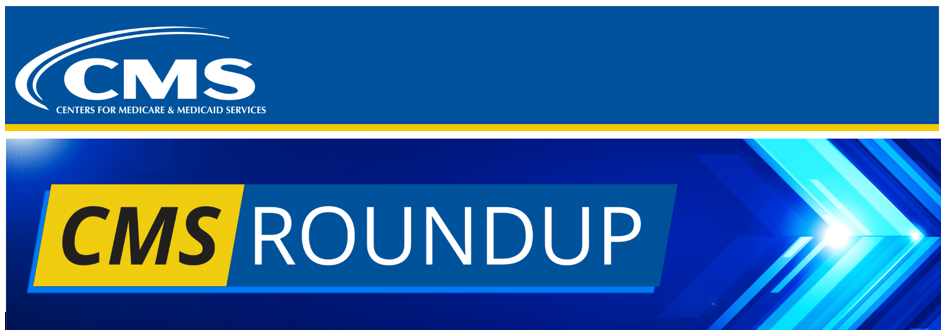CMS Round Up
CMS Roundup (Jan. 12, 2023)
Today, the Centers for Medicare & Medicaid Services (CMS) provides an at-a-glance summary of news from around the agency.
CMS Details State Spending Plans for Home & Community-Based Services Under American Rescue Plan
January 4: CMS released state spending plan summaries for section 9817 of the American Rescue Plan Act of 2021 (ARP). The spending plan summaries illustrate how states expect to spend $36.8 billion on activities to enhance, expand, or strengthen home and community-based services (HCBS) under Medicaid. States’ activities focus on workforce recruitment and retention, workforce training, quality improvement, efforts to reduce or eliminate waiting lists, expansions of the use of technology, opportunities to support caregivers, and ways to address social determinants of health and promote equity.
CMS Releases Second Annual Evaluation Report on End-Stage Renal Disease Treatment Choice Model
January 4: CMS released the second evaluation report on the End-Stage Renal Disease (ESRD) Treatment Choice (ETC) Model. ETC is a mandatory model composed of dialysis facilities and care providers aiming to increase home dialysis, transplant waitlisting, and living donor transplantation. The report shows that the model did not affect utilization of home dialysis, living donor transplantation, nor transplant waitlisting. The model also did not impact Medicare spending, in-center dialysis patient experience of care, quality, mortality, or outcomes related to health equity, nor most utilization outcomes, including hospital admissions or readmissions.
CMS Invites Proposals for the 2024 CMS Health Equity Conference, May 29-30
January 8: CMS issued a call for proposals for the 2024 CMS Health Equity Conference, scheduled for May 29 - 30, 2024. The free two-day conference will be held at the Hyatt Regency Hotel in Bethesda, Maryland, and available for online participation. This year’s conference will build on the energy and success of the inaugural 2023 conference, which attracted 500 in-person and 5,000 virtual attendees. This year’s theme is “Sustaining Health Equity Through Action.” Community organizations, academics, researchers, and others are encouraged to submit proposals through February 9. Proposals must focus on this year’s theme and align with the priority areas of the CMS Framework for Health Equity 2022-2032 or its companion document, the CMS Framework for Advancing Health Care in Rural, Tribal, and Geographically Isolated Communities. Information and guidelines for submitting proposals can be found here. Guidelines will also be reviewed during a “Call for Proposals Webinar” on January 18 at 2 p.m. ET. Registration for the webinar can be found here.
CMS Highlights Efforts to Address Health Disparities in Rural Communities
January 9: CMS posted the Rural Health Cross-Cutting Initiative fact sheet highlighting recent accomplishments by the Biden-Harris Administration to improve quality, equity, and outcomes across the health care system, focusing on those living in rural communities facing challenges in accessing health care.
CMS Celebrates Health Care Coverage in North Carolina
January 10: CMS Administrator Chiquita Brooks-LaSure attended an Affordable Care Act Marketplace event in Raleigh, North Carolina. The Administrator met with the North Carolina Navigator Consortium, then with Governor Roy Cooper at Martin Street Baptist Church. They discussed the importance of the Marketplace, announced the more than 20 million sign ups so far during this Open Enrollment, and celebrated North Carolina’s Medicaid Expansion, which began on December 1, 2023 and has already enrolled over 300,000 people.
CMS Releases Final Evaluation Report for Next Generation Accountable Care Organization Model
January 11: CMS released the final report for the Next Generation Accountable Care Organization (NGACO) Model, which ran from 2016-2021. The NGACO Model was designed to test whether high financial risk, more predictable payment flows, and flexibility in care delivery could reduce Medicare spending and improve value for Medicare beneficiaries. The report presents findings from a mixed methods evaluation, which found an approximate $1.7 billion reduction in Medicare Parts A and B spending without reductions in quality of care. Consistent with the model’s spending declines, the model was also associated with declines in hospital admissions, post-acute care, emergency department visits, and ambulatory visits.
Other Recent Releases:
###
CMS, an agency within the U.S. Department of Health and Human Services, serves the public as a trusted partner and steward, dedicated to advancing health equity, expanding coverage, and improving health outcomes. The agency protects public health by administering the Medicare program and working in partnership with state governments to administer Medicaid, CHIP, and the Health Insurance Marketplace.
Get CMS news at cms.gov/newsroom, sign up for CMS news via email, and follow CMS on Twitter @CMSgov



